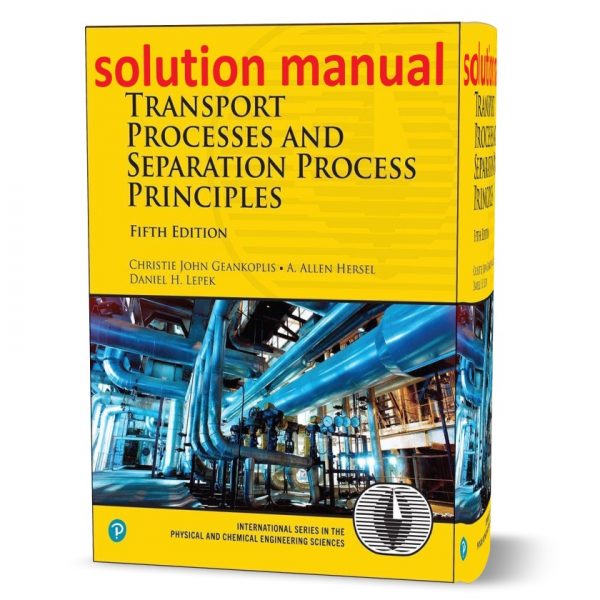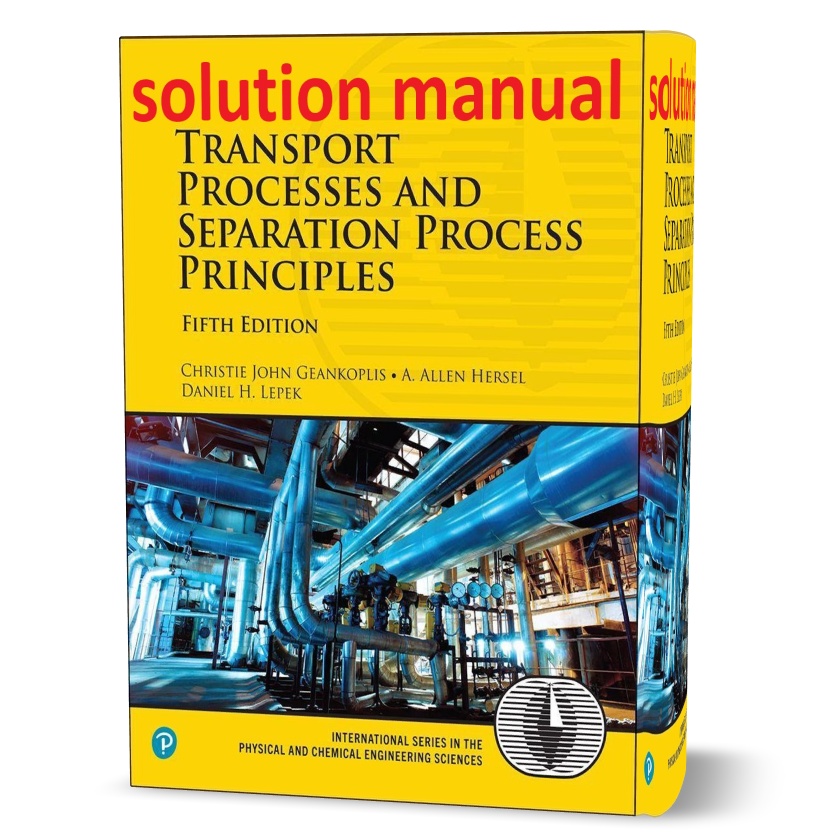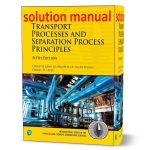Transport processes and separation process principles Geankoplis 5th edition solution manual pdf
Original price was: $30.00.$23.50Current price is: $23.50.
Published: Pearson 2018
Edition: 5th
Pages: 678
Type: pdf
Size: 45 MB
Content: This File includes Chapter 1 to 32 questions answers .some of the questions did not answered in this file. to see the NOT answered problem number click here [ not answered questions]
Sample: Solution sample file
Instantly Download After Payment
- Description
- Reviews (0)
Description
Description
In this Download free Transport processes and separation process principles Geankoplis 5th edition solution manual pdf | solutions updated fifth edition of Transport Processes and Separation Process Principles, the main objective was to reorganize the text into a new format that resembles contemporary transport phenomena and separations texts. Due to this overhaul, the total number of chapters has been increased from 14 to 33. Our hope is that the readability and the usage of the text have been improved for student learning. In addition, we have created numerous new homework problems, which can be found on our companion website Due to the prior widespread adoption of previous editions of the text. for more download ebook solutions click here.
Transport processes and separation process principles Geankoplis 5th edition solution manual pdf
we made Download free Transport processes and separation process principles Geankoplis 5th edition solution manual pdf | solutions small changes to the content of the fifth edition of the text so that many more readers could adapt to the new format. Since chemical and other engineering students must study many different topics today, we have provided a more unified introduction to the transport processes of momentum, heat, and mass transfer, and to the application of separation processes. In this text, the principles of transport processes are covered first, and then the separation processes (unit operations) are covered later. To accomplish this, the text is divided into two major parts.
Part 1: Transport Processes: Momentum, Heat, and Mass
This first part of the text deals with the fundamental principles of transport phenomena. Fluid Mechanics: 1. Introduction to Engineering Principles and Units; 2. Introduction to Fluids and Fluid Statics; 3. Fluid Properties and Fluid Flows; 4. Overall Mass, Energy, and Momentum Balances; 5. Incompressible and Compressible Flows in Pipes; 6. Flows in Packed and Fluidized Beds; 7. Pumps, Compressors, and Agitation Equipment; 8. Differential Equations of Fluid Flow; 9. Non-Newtonian Fluids; 10. Potential Flow and Creeping Flow; 11. Boundary-Layer and Turbulent Flow.
Heat Transfer:
12. Introduction to Heat Transfer; 13. Steady-State Conduction; 14. Principles of Unsteady-State Heat Transfer; 15. Introduction to Convection; 16. Heat Exchangers; 17. Introduction to Radiation Heat Transfer.
Mass Transfer: 18. Introduction to Mass Transfer; 19. Steady-State Mass Transfer; 20. Unsteady-State Mass Transfer; 21. Convective Mass Transfer. Part 2: Separation Process Principles (Includes Unit Operations)
This part of the text deals with applications of transport processes and covers separation processes in the following chapters: 22. Absorption and Stripping; 23. Humidification Processes; 24. Filtration and Membrane Separation Processes (Liquid—Liquid or Solid—Liquid Phase); 25. Gaseous Membrane Systems; 26. Distillation; 27. Liquid—Liquid Extraction; 28. Adsorption and Ion Exchange; 29. Crystallization and Particle Size Reduction; 30. Settling, Sedimentation, and Centrifugation; 31. Leaching; 32. Evaporation; 33. Drying.
In Chapter 1, elementary principles of mathematical and graphical methods, laws of chemistry and physics, material balances, and heat balances are reviewed. Many readers, especially chemical engineers, may be familiar with most of these principles, and may omit all or parts of the chapter.
This text may be used for
a course of study that follows any of the five suggested plans noted below. In all plans, the inclusion of Chapter 1 is optional. 1. Study of transport processes of momentum, heat, and mass, and separation processes. In this plan, most of the text covers the principles of the transport processes in Part 1 and the separation processes in Part 2. This plan would be applicable primarily to chemical engineering as well as to other process-engineering fields in a one-and-one-half-year course of study at the junior and/or senior level. 2. Study of transport processes of momentum, heat, and mass, and selected separation processes. Only the elementary sections of Part 1 (the principles chapters, 1-21) are covered, plus selected separation processes topics from Part 2 that are applicable to a particular field, in a two-semester or three-quarter course. 3. Study of transport processes of momentum, heat, and mass.
New to this:
The purpose of this plan in a two-quarter or two-semester course is to obtain a basic understanding of the transport processes of momentum, heat, and mass transfer. This involves covering only the sections of Part 1 (Chapters 1-21) and omitting Part 2, the applied chapters on separation processes. 4. Study of separation processes. If the reader has had courses in the transport processes of momentum, heat, and mass, then Part 1 (Chapters 1-21) can be omitted and only the separation processes chapters in Part 2 are studied in a one-semester or two-quarter course. This plan could be used by chemical and certain other engineers.




Reviews
There are no reviews yet.